|
|
|
Sort Order |
|
|
|
Items / Page
|
|
|
|
|
|
|
| Srl | Item |
| 1 |
ID:
127452
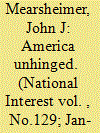

|
|
|
|
|
| Publication |
2014.
|
| Summary/Abstract |
SINCE EARLY 2011, political developments in Egypt and Syria have repeatedly captured the attention of the American foreign-policy elite. The Obama administration has tried to guide the turbulent political situation in post-Mubarak Egypt and become increasingly engaged in Syria's bloody civil war. The United States is already helping arm some of the forces fighting against the Assad regime, and President Obama came close to attacking Syria following its use of chemical weapons in August 2013. Washington is now directly involved in the effort to locate and destroy Syria's chemical-weapons stockpiles.
|
|
|
|
|
|
|
|
|
|
|
|
|
|
|
|
| 2 |
ID:
165745
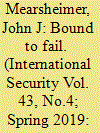

|
|
|
|
|
| Summary/Abstract |
The liberal international order, erected after the Cold War, was crumbling by 2019. It was flawed from the start and thus destined to fail. The spread of liberal democracy around the globe—essential for building that order—faced strong resistance because of nationalism, which emphasizes self-determination. Some targeted states also resisted U.S. efforts to promote liberal democracy for security-related reasons. Additionally, problems arose because a liberal order calls for states to delegate substantial decisionmaking authority to international institutions and to allow refugees and immigrants to move easily across borders. Modern nation-states privilege sovereignty and national identity, however, which guarantees trouble when institutions become powerful and borders porous. Furthermore, the hyperglobalization that is integral to the liberal order creates economic problems among the lower and middle classes within the liberal democracies, fueling a backlash against that order. Finally, the liberal order accelerated China's rise, which helped transform the system from unipolar to multipolar. A liberal international order is possible only in unipolarity. The new multipolar world will feature three realist orders: a thin international order that facilitates cooperation, and two bounded orders—one dominated by China, the other by the United States—poised for waging security competition between them.
|
|
|
|
|
|
|
|
|
|
|
|
|
|
|
|
| 3 |
ID:
069603


|
|
|
| 4 |
ID:
062411
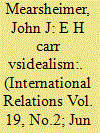

|
|
|
| 5 |
ID:
101609


|
|
|
|
|
| Publication |
2010.
|
| Summary/Abstract |
The United States has been the most powerful state on the planet for many decades and has deployed robust military forces in the Asia-Pacific region since the early years of the Second World War. The American presence has had significant consequences for Australia and for the wider region. This is how the Australian government sees it, at least according to the 2009 Defence White Paper: 'Australia has been a very secure country for many decades, in large measure because the wider Asia-Pacific region has enjoyed an unprecedented era of peace and stability underwritten by US strategic primacy'. 1 The United States, in other words, has acted as a pacifier in this part of the world.
|
|
|
|
|
|
|
|
|
|
|
|
|
|
|
|
| 6 |
ID:
101304
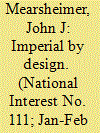

|
|
|
| 7 |
ID:
182256
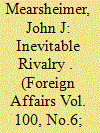

|
|
|
|
|
| Summary/Abstract |
It was a momentous choice. Three
decades ago, the Cold War ended, and
the United States had won. It was
now the sole great power on the planet.
Scanning the horizon for threats, U.S.
policymakers seemed to have little cause
for concern—and especially not about
China, a weak and impoverished country
that had been aligned with the United
States against the Soviet Union for over a
decade. But there were some ominous
signs: China had nearly *ve times as
many people as the United States, and its
leaders had embraced economic reform.
Population size and wealth are the main
building blocks ofmilitary power, so
there was a serious possibility that China
might become dramatically stronger in
the decades to come. Since a mightier
China would surely challenge the U.S.
position in Asia and possibly beyond, the
logical choice for the United States was
clear: slow China’s rise.
|
|
|
|
|
|
|
|
|
|
|
|
|
|
|
|
| 8 |
ID:
087611


|
|
|
|
|
| Publication |
2009.
|
| Summary/Abstract |
In The Israel Lobby and U.S. Foreign Policy, we argued that the "special relationship" between the United States and Israel is due largely to the influence of a domestic interest group-comprised of Jews as well as non-Jews-and that this unusual situation is harmful to both the United States and Israel. Jerome Slater's thoughtful review endorses many of our central arguments, but it also highlights several points of disagreement. He argues that we overlooked important alternative sources, defined the lobby too broadly, and exaggerated its influence on Congress and especially the Executive Branch. Although Slater is even more critical of U.S. Middle East policy than we are, he argues that the special relationship is due to strong cultural and religious affinities and broad public support in American society, and not to the influence of the lobby. In fact, the alternative sources cited by Slater do not undermine our basic claims; a broad conception of the lobby makes more sense than his narrower definition; and there is little disagreement between us about the lobby's influence on Capitol Hill or in the White House. Most importantly, public opinion in the United States does not explain why the United States gives Israel such extensive and nearly unconditional backing. Although most Americans have a favorable image of Israel, surveys show that they also favor a more even-handed Middle East policy and a more normal relationship with Israel. Thus, the special relationship is due primarily to the lobby's influence, and not to the American people's enduring identification with the Jewish state.
|
|
|
|
|
|
|
|
|
|
|
|
|
|
|
|
| 9 |
ID:
073970
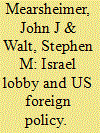

|
|
|
| 10 |
ID:
080066
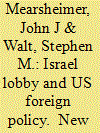

|
|
|
|
|
| Publication |
New York, Farrar, Straus and Giroux, 2007.
|
| Description |
xii, 484p.
|
| Standard Number |
9780374177720
|
|
|
|
|
|
|
|
|
|
|
|
Copies: C:1/I:0,R:0,Q:0
Circulation
| Accession# | Call# | Current Location | Status | Policy | Location |
| 052938 | 327.7305496/MEA 052938 | Main | On Shelf | General | |
|
|
|
|
| 11 |
ID:
040442
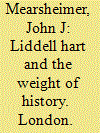

|
|
|
|
|
| Publication |
London, Brassey's Defence Publishers, 1988.
|
| Description |
ix, 234p.
|
| Series |
Cornell studies in security affairs
|
| Standard Number |
0080367011
|
|
|
|
|
|
|
|
|
|
|
|
Copies: C:1/I:0,R:0,Q:0
Circulation
| Accession# | Call# | Current Location | Status | Policy | Location |
| 031311 | 355.033541/MEA 031311 | Main | On Shelf | General | |
|
|
|
|
| 12 |
ID:
036495


|
|
|
|
|
| Publication |
Chicago, University of Chicago, 1985.
|
| Description |
395p.
|
| Standard Number |
0226317048
|
|
|
|
|
|
|
|
|
|
|
|
Copies: C:1/I:0,R:0,Q:0
Circulation
| Accession# | Call# | Current Location | Status | Policy | Location |
| 026520 | 355.0217/HAR 026520 | Main | On Shelf | General | |
|
|
|
|
| 13 |
ID:
090146


|
|
|
|
|
| Publication |
2009.
|
| Summary/Abstract |
Kenneth Waltz opted to reject the rational actor assumption in developing his theory of international politics. That choice, I argue in this article, creates three problems for his theory. First, it means that it is unsuited for explaining state behavior, which means it is of limited utility for explaining the workings of the international system. Second, Waltz's claim that his theory is well suited to explaining international outcomes - as opposed to state behavior - is unconvincing. Those outcomes are heavily influenced by the actions of the great powers, but if his theory cannot predict their behavior, it is unlikely to reliably predict the outcomes of their behavior. Third, Waltz's assumption that states often behave recklessly leads to a more competitive world than described in his theory. I conclude with the suggestion that the theory's greatest virtue is its normative value - its ability to explain how the world should work, not how it works.
|
|
|
|
|
|
|
|
|
|
|
|
|
|
|
|
| 14 |
ID:
128006


|
|
|
|
|
| Publication |
2014.
|
| Summary/Abstract |
WHAT ARE the implications for Taiwan of China's continued rise? Not today. Not next year. No, the real dilemma Taiwan will confront looms in the decades ahead, when China, whose continued economic growth seems likely although not a sure thing, is far more powerful than it is today.
Contemporary China does not possess significant military power; its military forces are inferior, and not by a small margin, to those of the United States. Beijing would be making a huge mistake to pick a fight with the American military nowadays. China, in other words, is constrained by the present global balance of power, which is clearly stacked in America's favor.
|
|
|
|
|
|
|
|
|
|
|
|
|
|
|
|
| 15 |
ID:
052277


|
|
|
|
|
| Publication |
New York, W.W.Norton & Company, 2001.
|
| Description |
xvi, 555p.
|
| Standard Number |
0393020258
|
|
|
|
|
|
|
|
|
|
|
|
Copies: C:1/I:0,R:0,Q:0
Circulation
| Accession# | Call# | Current Location | Status | Policy | Location |
| 045079 | 327.101/MEA 045079 | Main | On Shelf | General | |
|
|
|
|
| 16 |
ID:
071269
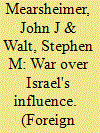

|
|
|
| 17 |
ID:
133665
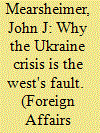

|
|
|
|
|
| Publication |
2014.
|
| Summary/Abstract |
Conventional wisdom in the West blames the Ukraine crisis on Russian aggression. But this account is wrong: Washington and its European allies actually share most of the responsibility, having spent decades pushing east into Russia's natural sphere of interest.
|
|
|
|
|
|
|
|
|
|
|
|
|
|
|
|
|
|
|
|
|